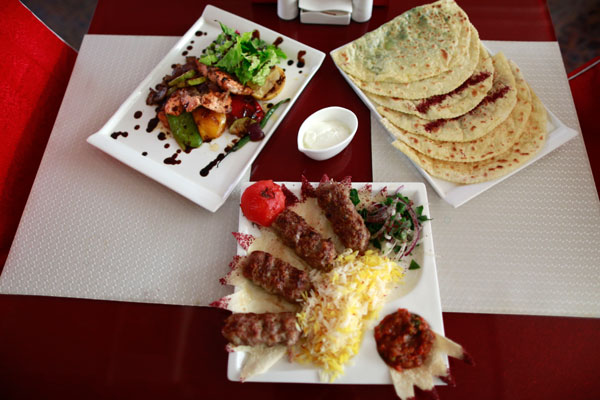New life for old cuisines
 |
|
Minced lamb (front), salmon (top left) and shuarma filled with meat or vegetables are mainstays on the Caspi menu. [Photo by Feng Yongbin / China Daily] |
Central Asian restaurants have made a place for themselves in Beijing's Russian district, and diners are licking their lips, Erik Nilsson reports. Erik Nilsson
The old Soviet Union is reuniting in Beijing - for dinner. At least its cuisine is. Central Asian fare has taken a central place at the table in the Yabaolu neighborhood's dining scene, as the city's "Russiatown" transforms into "Beijing-istan".
Natives of the "stans" are making culinary inroads into China's capital as the New Silk Road Economic Belt develops, while fewer Russian traders are frequenting the declining Yabaolu fur market that spurred the original development of the surrounding Slavic enclave.
This means compote, a juice of mixed fruits, is diluting volumes of vodka, as the tides of the boiled dried-fruit juice rise and the hard-drinking part of town dries up. (Actually, many of the area's Central Asian eateries are halal, but allow you to bring your own booze.) There's more yogurt and less mayonnaise. More kebabs and fewer cutlets. More plov (Central Asia's rice staple) and fewer potatoes.
These eateries dot the Shenlu dining street behind the fur market, sprinkled among restaurants serving sustenance from China's Xinjiang Uygur autonomous region, Mongolia, Turkey and Italy.
The staple - plov, or rice with meat and carrot strips, also known as pilaf - is the pride and joy. So much so that Shenlu's various Central Asian restaurant owners all declare their country as its originator of regionally common foods and beverages from compote to ayran - a drink made of yogurt, water and herbs.
"This area is a melting pot," says one restaurateur in the strip. "Compote is made from mixing different fruits. This area is made from mixing different (countries') restaurants."
Compote is believed to benefit the heart, liver and digestion. But like plov, every eatery's compote is idiosyncratic. Shenlu's Azerbaijan restaurant Caspi offers lime and cherry versions, for instance.






















